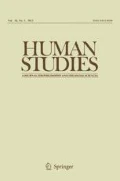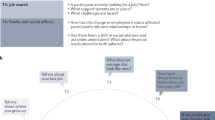Summary
This article explicates, in a concrete, step-by-step manner, some procedures that can be followed in phenomenologically analyzing interview data. It also addresses a number of issues that are raised in relation to phenomenological research.
Similar content being viewed by others
References
Allport, G. Letters from Jenny. New York: Harcourt, Brace and World, 1965.
Bogdan, R. & Taylor, I. Introduction to qualitative research methods: a phenomenological approach to the social sciences. New York: Wiley and Sons, 1975.
Buber, M. The knowledge of man. (ed.) M. Friedman, New York: Harper & Row, 1965.
Cahalan, W. The inventory of self: A phenomenological investigation of three delusional persons. Unpublished doctoral dissertation. California School of Professional Psychology-San Diego, 1978.
Colaizzi, P. Reflection and research in psychology. Dubuque: Kendall-Hunt, 1973.
Colaizzi, P. Psychological research as a phenomenologist views it. In R. Valle & M. King, Existential-phenomenological alternatives for psychology. New York: Oxford University Press, 1978.
Coles, R. The method. In R.J. Lifton & E. Olson (ed.) Explorations in psychohistory. New York: Simon and Schuster, 1974.
Ellenberger, H.F. A clinical introduction to psychiatric phenomenology and existential analysis. In R. May, E. Angel and H.F. Ellenberger (ed.), Existence. New York: Basic Books, 1958.
Esterson, A. The leaves of spring: A study in the dialectics of madness. London: Tavistock Publications, 1970.
Fischer, C. Toward the structure of privacy: implications for psychological assessment. In A. Giorgi, W.F. Fischer, and R. von Eckartsberg (Ed.), Duquesne studies in phenomenological psychology. Pittsburgh: Duquesne University Press, 1971.
Fischer, C. Being criminally victimized: a qualitative account. Working paper for research project at Duquesne University, 1977.
Fischer, W.F. Theories of anxiety. New York: Harper and Row, 1970.
Friedman, M. Dialogue and the unique. Journal of Humanistic Psychology, 1972, (12(2) 7–22.
Giorgi, A. Psychology as a human science. New York: Harper & Row, 1970.
Giorgi, A. Toward phenomenologically based research in psychology. Journal of Phenomenological Psychology, 1970, 1, 75–98.
Giorgi, A., Fischer, W.F., & von Eckartsberg, R. Duquesne studies in phenomenological psychology. Vol. I. Pittsburgh: Duquesne University Press, 1971.
Giorgi, A. An application of phenomenological method. In A. Giorgi, C. Fischer, & E. Murray (Ed.), Duquesne studies in phenomenological psychology. Vol. II. Pittsburgh: Duquesne University Press, 1975.
Henry, J. Pathways to Madness. New York: Random House, 1965.
Husserl, E. Phenomenology and the crisis of philosophy. (Tr.) Q. Lauer, New York: Harper and Row, 1965.
Hycner, R. The experience of wonder: a phenomenological exploration and its implications for therapy. Unpublished doctoral dissertation, California School of Professional Psychology-San Diego, 1976.
Keen, E. A primer in phenomenological psychology. New York: Holt, Reinhart and Winston, Inc., 1975.
Maslow, A. Toward a psychology of being (2nd edition) New York: Van Nostrand Reinhold Company, 1968.
Maslow, A. The psychology of science: A reconnaissance. Chicago: Henry Regnery Company, 1966.
Merleau-Ponty, M. The phenomenology of perception. Trans. C. Smith. London: Routledge & Kegan Paul Ltd. 1962.
Murray E. & Giorgi, A. (Ed.) Duquesne papers in phenomenological psychology. Vol. I. Pittsburgh: Duquesne University Press, 1974.
Polanyi, M. Personal knowledge: Towards a post-cutical philosophy. New York: Harper and Row, 1958.
Polkinghorne, D. Lecture on phenomenological psychology given at the California School of Professional Psychology-San Diego, 1978.
Price, D. & Barrel, J. An experiential approach with quantitative methods: a research paradigm. Journal of Humanistic Psychology, 1980, 20(3), 75–95.
Psathas, G. (Ed.) Phenomenological sociology: issues and applications. New York: Wiley Publications, 1973.
Quantrano, A.J. Identity formation in the borderline personality: a phenomenological study. Unpublished doctoral dissertation, California school of Professional Psychology-San Diego, 1980.
Rogers, C. On becoming a person. Boston & Houghton Mifflin Company, 1961.
Sardello, R.J. A reciprocal participation model of experimentation. In A. Giorgi, W.F. Fischer, & R. von Eckartsberg (Ed.) Duquesne studies in phenomenological psychology. Pittsburgh: Duquesne University.
Smith, D. & Murray, E. (Ed.) Duquesne papers in phenomenological psychology. Vol. II, Pittsburgh: Duquesne University Press, 1977.
Spiegelberg, H. The phenomenological movement. Vol. II. 2nd ed. Hague: Martinus Nijhoff, 1971.
Stevick, E. An empirical investigation of the experience of anger. In A. Goirgi, W. Fischer, & R. von Eckartsberg (Ed.) Duquesne studies in phenomenology psychology Pittsburgh: Duquesne University Press, 1971.
Tesch, R. Phenomenological and transformative research: What they are and how to do them. Santa Barbara: Fielding occasional papers, 1980.
Valle, R. & King, M. (Ed.) Existential-phenomenological alternatives for psychology. New York: Oxford University Press, 1978.
Van den Berg, J.H. A different existence. Pittsburgh: Duquesne University Press, 1972.
Van Kaam, A. Existential foundations of psychology. Pittsburgh, Duquesne University Press, 1966.
Van Kaam, A. Phenomenal analysis: Exemplified by a study of the experience of really feeling understood. Journal of Individual Psychology, 1959, 15, 66–72.
Author information
Authors and Affiliations
Rights and permissions
About this article
Cite this article
Hycner, R.H. Some guidelines for the phenomenological analysis of interview data. Hum Stud 8, 279–303 (1985). https://doi.org/10.1007/BF00142995
Issue Date:
DOI: https://doi.org/10.1007/BF00142995




